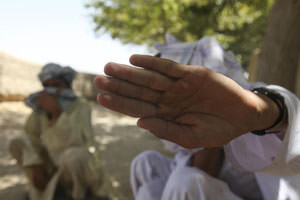Reality Is Its Own Caricature for U.S. in Afghanistan and Pakistan
The problem with U.S.-sponsored elections in the non-Western world, as in Afghanistan on Thursday, is that they seek to legitimize America's presence in the country, where it is typically not wanted.
The problem with U.S.-sponsored elections in Asia and elsewhere in the non-Western world, as in Afghanistan on Thursday, is that they are sponsored by the United States primarily to legitimize its own presence in the country.
A poll sponsored by the Qatar-based satellite broadcaster Al Jazeera recently asked respondents in Pakistan to identify what they considered the greatest threat to Pakistan today. Eleven percent said it was the Taliban militants; 18 percent said it was the traditional enemy, India; and 59 percent said that the United States was the biggest threat to Pakistan.
A New York Times report published Thursday described the efforts of American officials, including Richard Holbrooke, to convince Pakistani officials, journalists and other notables that the U.S. is anxious to build bridges between Pakistan and the United States, and that the Obama administration represents a great change from the Bush administration.
Holbrooke is President Barack Obama’s special representative to Pakistan and Afghanistan. He told an audience in Karachi that the U.S. under Obama wants to see an improvement in the lives of Pakistanis, and more business opportunities for them as well.
The new administration’s undersecretary of state for public diplomacy and public affairs, Judith A. McHale, met a group of Pakistani journalists, including Ansar Abbasi, an important commentator critical of U.S. policy. She spoke warmly of U.S.-Pakistani relations, and Abbasi politely listened, thanking her for coming. He then, according to McHale afterward, said, “You should know that we hate all Americans. From the bottom of our souls, we hate you.”
McHale also reported that Abbasi went on to explain that Americans “are no longer human beings because [their] goal was to eliminate other humans.” He said that “thousands of innocent people had been killed because [Americans] are trying to find Osama bin Laden.”
To quote the Times’ characterization of McHale’s remarks afterward, “She said that even though she knew that she did not sway Mr. Abbasi, it was good to hear what he thought because she wanted to try to understand the source of much of the anti-Americanism in Pakistan.”
Twelve days earlier, in Washington, Holbrooke had held another press conference, accompanied by many from his team in Pakistan. The purpose was to explain to the American television audience that the mission in Afghanistan is to kill or capture drug traffickers, help farmers grow food instead of poppies, build a public health system, build “civil society” there, and in general rebuild the country.
However, ex-NATO commander Gen. Wesley Clark, another adviser to President Obama, shortly afterward cited the lessons of Vietnam, and said he had counseled the president to emphasize the pursuit of al-Qaida, and not confuse Americans about being in Afghanistan to create a democracy. “Learn the lessons of the past; don’t repeat them.”
Building a new democratic state in Afghanistan might be thought a large ambition, even if the famously energetic Holbrooke and President Obama had the 20 to 30 years or more necessary to get started on such an undertaking, and if the Afghans would put up with the Americans trying to do it.
Ambassador Holbrooke expressed the ambition to add a spiritual dimension to his efforts in the region. He said the religiously motivated enemies of the American presence in Asia “present themselves as false messengers of a prophet, which is what they do. And we need to combat it.” (Surely he has his theology badly confused?)
The New York Times report on this press conference was headlined “U.S. Turns to Radio Stations and Cell Phones to Counter Taliban’s Propaganda,” emphasizing what would seem to be a star project of Holbrooke’s “counterinsurgency expert,” Vikram Singh. It is to build a communications and media system that can reach into every Afghan village to deliver an anti-Taliban message.
As Afghanistan is a very large and mountainous country, and one of the poorest in the world, one would like to know his plan for regularly delivering replacement batteries necessary to millions of peasants to power the new cell phones they have been given, as well as supplying guards (from Blackwater?) to protect from the Taliban the thousands or tens of thousands of satellite receivers or relay stations necessary to deliver the Voice of America into Afghan homes.
Suppose the Taliban taps into the network and delivers its own messages? A learned friend of mine quoted Herbert Marcuse on this plan: “Reality is its own caricature.”
Visit William Pfaff’s Web site at www.williampfaff.com.
© 2009 Tribune Media Services, Inc.
Your support matters…Independent journalism is under threat and overshadowed by heavily funded mainstream media.
You can help level the playing field. Become a member.
Your tax-deductible contribution keeps us digging beneath the headlines to give you thought-provoking, investigative reporting and analysis that unearths what's really happening- without compromise.
Give today to support our courageous, independent journalists.






You need to be a supporter to comment.
There are currently no responses to this article.
Be the first to respond.